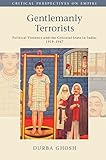Gentlemanly terrorists : political violence and the colonial state in India, 1919-1947 / Durba Ghosh, Cornell University, New York.
Material type: TextSeries: Critical perspectives on empirePublisher: Cambridge, United Kingdom ; New York, NY : Cambridge University Press, 2017Description: xv, 275 pages, 22cmContent type:
TextSeries: Critical perspectives on empirePublisher: Cambridge, United Kingdom ; New York, NY : Cambridge University Press, 2017Description: xv, 275 pages, 22cmContent type: - 9781108446501 (alk. paper)
- National liberation movements -- India -- History -- 20th century
- Political violence -- India -- History -- 20th century
- Revolutionaries -- India -- History -- 20th century
- Nationalism -- India -- History -- 20th century
- India -- History -- British occupation, 1765-1947
- India -- Politics and government -- 1919-1947
- 363.3250954 GHO
| Item type | Current library | Collection | Call number | Status | Date due | Barcode | |
|---|---|---|---|---|---|---|---|
 Books
Books
|
H.T. Parekh Library | SIAS Collection | 363.3250954 GHO (Browse shelf(Opens below)) | Available | K2694 |
Rs.525/-
Includes bibliographical references and index.
Introduction -- The reforms of 1919: Montagu-Chelmsford, the Rowlatt Act, Jails Commission, and the Royal Amnesty -- The history of revolutionary terrorism through autobiography -- After Chauri Chaura: the revival and repression of revolutionary terrorism -- After the Chittagong Armoury raid: revolutionary terrorism in the 1930s -- From political prisoner to security prisoner -- Revolutionary autobiographies: postcolonial tellings of nationalist history -- Conclusion.
In Gentlemanly Terrorists, Durba Ghosh uncovers the critical place of revolutionary terrorism in the colonial and postcolonial history of modern India. She reveals how so-called 'Bhadralok dacoits' used assassinations, bomb attacks, and armed robberies to accelerate the departure of the British from India and how, in response, the colonial government effectively declared a state of emergency, suspending the rule of law and detaining hundreds of suspected terrorists. She charts how each measure of constitutional reform to expand Indian representation in 1919 and 1935 was accompanied by emergency legislation to suppress political activism by those considered a threat to the security of the state. Repressive legislation became increasingly seen as a necessary condition to British attempts to promote civic society and liberal governance in India. By placing political violence at the center of India's campaigns to win independence, this book reveals how terrorism shaped the modern nation-state in India.
There are no comments on this title.


